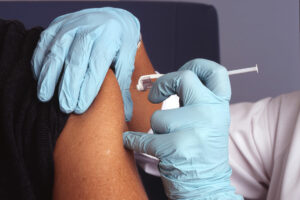Vaccination across the life stages

Over the next decade, changes in population demography, disease epidemiology, and the availability of new vaccines will increase the need to reach different age groups across the life course, according to the World Health Organization (WHO).
Life-course immunization will open opportunities for immunization services to be integrated with other health programs. This has the potential to provide a more people-centered approach to health across each stage of life.
Immunization programs that are better integrated in the wider health system can more comprehensively address population health needs over time, make efficient use of resources, and improve health outcomes, especially of those who are underserved, the WHO said.
Vaccine experts who spoke during the “Injecting Hope” seminar-workshop held in Manila reiterated the WHO’s message that vaccination across life stages protects all populations from vaccine-preventable diseases.
The two-day event was organized by the Philippine Press Institute in partnership with the Pharmaceutical and Healthcare Association of the Philippines (PHAP) and member Pfizer Philippines, along with the Philippine Medical Association (PMA), Philippine Foundation for Vaccination, and Philippine Alliance for Patient Organizations.
“Getting the recommended vaccines does not end when a child reaches one year of age. Vaccines during school age, adolescence, and adulthood are equally important,” stressed Dr. Janis Bunoan-Macazo, Department of Health (DoH) Program Manager for the National Immunization Program (NIP).
In line with its thrust on life-course immunization, the DoH through the NIP, provides free vaccines during pregnancy (tetanus-diphtheria), neonatal age (BCG, hepatitis B vaccine), infancy (oral polio vaccine, inactivated polio vaccine, DPT-HepB-Hib, pneumococcal conjugate vaccine, measles-mumps-rubella). Also included are childhood (measles-containing vaccine, tetanus-diphtheria), adolescence (human papillomavirus vaccine, measles-containing vaccine, tetanus-diphtheria), and adulthood (flu vaccine, pneumococcal polysaccharide vaccine).
Dr. Benito Atienza, immediate past president of the PMA, suggested ways to promote life-course immunization in the country. These are, among others, instituting annual National Vaccination Days for all Filipinos, and creating a synchronized and digital national individual immunization record database.
He also recommended requiring immunization records for school enrolment and updated immunization records for high school and college enrolment. Another way forward is including vaccine history in annual physical examinations for employment and incorporating lectures on immunization by vaccine experts in the science subject for grade school and high school.
Older adults or the elderly must get their recommended vaccines, as they are considered vulnerable or at-risk populations, said Dr. Lourdes Carolina I. Dumlao.
As president of the Philippine Society of Geriatrics and Gerontology, she explained that the elderly undergo natural changes in their immune system (immunosenescence) as well as chronic inflammation (inflammaging) that results in a progressive decrease in the aging body’s ability to trigger effective antibody and cellular responses against infection and vaccinations.
Dr. Dumlao cited the US Centers for Disease Control and Prevention-recommended vaccines for individuals ages 65 and older. These are vaccines for COVID-19, Haemophilus influenzae b (Hib), hepatitis A and hepatitis B, herpes zoster (shingles), influenza (flu), measles-mumps-rubella, meningococcal A/C/W/Y, meningococcal B, pneumococcal, tetanus-diphtheria-pertussis, and varicella (chickenpox).
Variant-specific COVID-19 vaccinations are important to protect priority populations such as the elderly who are at risk of hospitalization and complications, said Dr. Rontgene Solante, Chairman of Adult Infectious Diseases and Tropical Medicine, San Lazaro Hospital.
He noted that the recent increase in cases of influenza-like illnesses (ILIs) in the country is due to new COVID-19 variants of concern (VOCs) causing new infections and hospitalizations. At the same time, these VOCs are co-circulating with other respiratory viruses, such as influenza, parainfluenza, rhinovirus (the common cold), adenovirus, enterovirus, and respiratory syncytial virus (RSV).
Dr. Solante said that long-term vaccination programs should include vaccines for COVID-19 aside from other vaccine-preventable diseases like influenza and pneumonia as part of life-course immunization for vulnerable populations. He also recommended surveillance and tracking of ILIs to prevent outbreaks.
The year 2024 must be the time to kickstart life-course immunization so that families and individuals could get the needed protection from vaccine-preventable diseases amidst developments that could impact health this year.
Teodoro B. Padilla is the executive director of Pharmaceutical and Healthcare Association of the Philippines (PHAP). PHAP represents the biopharmaceutical medicines and vaccines industry in the country. Its members are in the forefront of research and development efforts for COVID-19 and other diseases that affect Filipinos.




